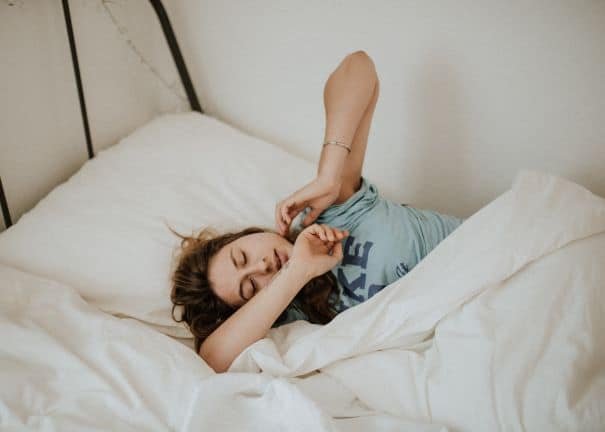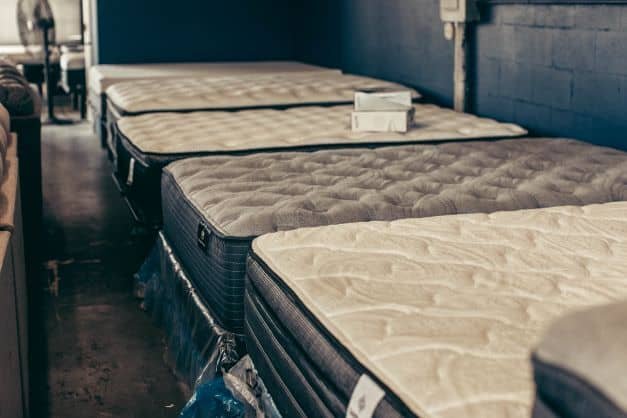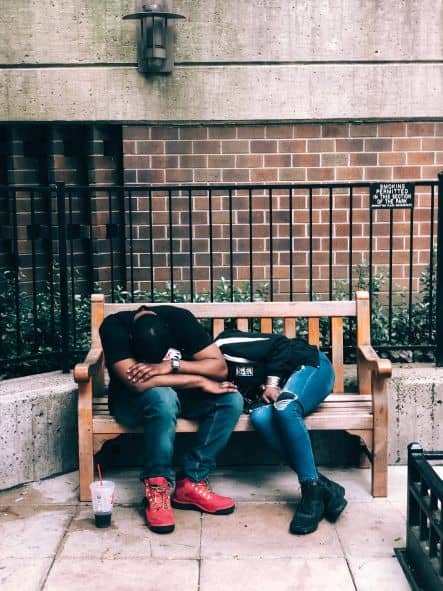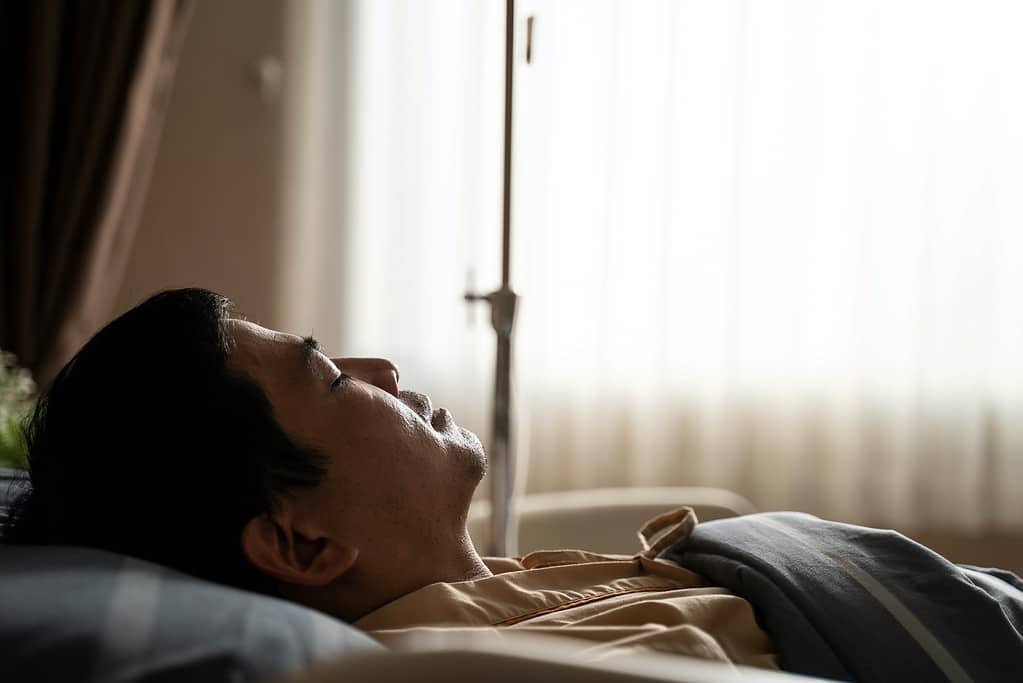Understanding Sleep – Questions Answered
Sleep is a natural state of unconsciousness that we go through every night, but it’s also one of the essential things in our lives. It allows us to rest and recover from the rigours of the day while also helping us remember what happened during that time. That sounds like a pretty good deal! But what goes on in our brains when we sleep? Here’s a quick breakdown:
Why do we sleep
The primary reason you sleep is to restore the body and mind. Sleep helps your body recover from stress and exhaustion and replenishes energy levels so that you’re ready for a new day. When we sleep, our brains consolidate memories (meaning we get better at remembering things). Still, it also helps our bodies grow: For example, growth hormones are released during childhood when children sleep. In adults, these hormones have been found to improve the immune system and increase muscle mass.
Sleep also allows us to recharge ourselves mentally by clearing out waste products in our brain—a process called “synaptic homeostasis” or “rebalancing” (similar to how regular cleaning keeps your house organized). This process occurs every time you fall asleep at night; however, some people may find it difficult—or downright impossible—to fall asleep if they’re not rested enough!
How much sleep do we need?
The amount of sleep you need depends on age, gender, and how much you awake during the day. Most adults require 7-9 hours per night. Children need more—about 10-12 hours a night! However, some people have different needs (for example, teenagers need about 9-10 hours per night).
Sleep needs are also different for men and women because their bodies function differently during sleep, which is why it’s essential to understand yourself before setting a goal amount of sleep that works best. The amount of sleep you also need changes as you age. For example, newborns sleep an average of 16 hours daily, while elderly adults only sleep around 6-7 hours per day.
Don’t be surprised if you need more sleep as you age! As we age, our bodies undergo changes that make it harder to get a good night’s rest. For example, older adults may have more trouble sleeping through the night because they must urinate more frequently.
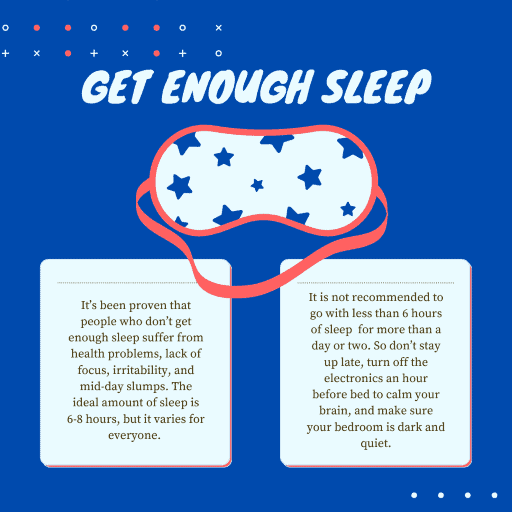
What happens when we sleep
When you sleep, your brain activity slows down. This is called calm and quiet sleep. Your body temperature also drops, and your muscles relax. During this sleep phase, your brain releases the hormone melatonin to make you feel sleepy; this helps prepare you for deep sleep later on. During deep sleep (slow-wave or delta-wave), your body repairs itself from damage caused by stress and ageing. Growth hormone is released during deep sleep to restore protein stores in muscles, skin, bones and other tissues in preparation for physical activity when we wake up again. It also restores energy reserves during the day through detoxification processes that remove toxins from the liver and kidneys.
REM or dreamless sleeping is when our minds become active with vivid dreams — but there’s no muscle movement taking place during this REM phase because it occurs while we’re lying down flat on our backs with our eyes closed! When we enter into a REM stage of sleeping, our bodies are paralyzed – which means we can’t move even though we may be dreaming about doing so!
What happens if we don’t get enough sleep
The most obvious consequence of not getting enough sleep is being tired. You may feel sluggish and irritable, leading to problems at work or school. It’s also likely that your attention span will be reduced, making it hard to focus on tasks and remember what you’ve learned.
If this continues over time, lack of sleep can affect your mood more profoundly: studies have shown that chronically tired people are more prone to depression than those who get enough restful sleep. Sleep deprivation can also increase the risk of accidents; when we’re tired, we tend to make mistakes such as misreading signs or missing things from the corner of our eye (“microsleeps”). This could result in anything from minor fender benders to car crashes—even worse!
Why does the brain produce dreams while we sleep
The jury is still out on this one! Some scientists believe that dreams are a way for the brain to process information and sort through memories, while others think they may result from the random firing of neurons during sleep. However, evidence suggests that dreams have a purpose: people who cannot dream (due to conditions like REM sleep behaviour disorder) tend to have more mental health problems than those who dream. It’s also worth noting that not everyone dreams every night: some people only dream a few times per month, while others may have several dreams in one night.
What is sleepwalking, and is it dangerous
Sleepwalking, or somnambulism, is a disorder in which people get up and walk around while asleep. It usually happens during the deep sleep phase, when people are less likely to remember what happened afterwards. Sometimes, sleepwalkers may even leave their homes and wander outside! Sleepwalking isn’t usually dangerous, but it can be if sleepwalkers walk into traffic or try to climb stairs without waking up first. If you’re worried about someone you know who sleepwalks, it’s best to talk to a doctor.
How do over-the-counter sleep medications work
There are a few different types of over-the-counter sleep medications, but most work by reducing the time it takes to fall asleep. Some of them may also help you stay asleep for more extended periods. The most common type of sleep medication is an antihistamine, which blocks the action of histamine, a chemical that promotes wakefulness. These medications can tire you and cause side effects like dry mouth, constipation, and difficulty urinating. If you’re considering taking over-the-counter sleep medication, you must talk to your doctor to ensure it’s safe.
How can we improve our sleep?
There are a few things you can do to improve your sleep:
- Follow a regular sleep schedule as much as possible – This means going to bed and waking up simultaneously each day. This isn’t possible for many people because they work many shifts during the week. For example, if you work at a restaurant, your sleep schedule may be completely different on Monday than Friday. However, it’s still important to stick to a regular schedule as much as possible.
- Create a relaxing bedtime routine – This may include taking a warm bath, reading a book, or writing in a journal. Doing these things will help your body and mind wind down so you can fall asleep more easily. It would be best if you worked hard to develop a routine that works for you and avoid doing things that will make it harder to fall asleep, such as watching television.
- Get enough exercise during the day – Exercise can help improve your sleep by making you tired at night. However, avoiding exercising too close to bedtime is essential, as this can make it harder to fall asleep. You need at least 30 minutes of moderate exercise daily to see a difference in your sleep. Moderate exercise includes activities like walking, swimming, and light biking.
- Ensure your bedroom is comfortable and dark – This means removing any light sources, such as electronic devices and ensuring the temperature is cool. You may also want to consider using a noise machine to help you block out any sources of noise.
- Avoid caffeine and alcohol before bed – Caffeine can make it harder to fall asleep, and alcohol can make you wake up during the night. If you drink caffeine or alcohol, do so at least 6 hours before bed. It would be best to avoid smoking, as nicotine is a stimulant that makes sleeping harder. There are many things you can do to improve your sleep. Talk to your doctor if you’re having trouble sleeping, as they may be able to help you find the cause of your sleep problems and offer more specific treatment options.
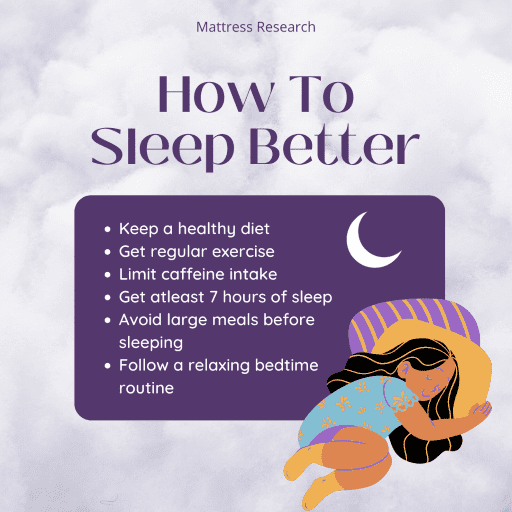
What are some common sleep disorders?
There are many different types of sleep disorders, but some of the most common include the following:
- Insomnia – Insomnia is a sleep disorder that makes falling or staying asleep difficult. As a result, people with insomnia may wake up frequently during the night or feel tired when they wake up in the morning.
- Sleep apnea – Sleep apnea is a sleep disorder that causes people to stop breathing briefly during sleep. This can cause snoring and make it difficult to get a good night’s sleep.
- Restless legs syndrome – Restless legs syndrome is a sleep disorder that causes people to have an irresistible urge to move their legs. This can make it difficult to fall asleep and stay asleep.
- Narcolepsy – Narcolepsy is a sleep disorder that causes people to fall asleep suddenly and without warning. This can happen during the day or at night.
If you think you may have a sleep disorder, talk to your doctor. They can help you diagnose the problem and find the best treatment options.
In this article, we’ve covered the basics of brain development. You now know how sleep cycles affect our brains and bodies and how they can disrupt them. We’ve also looked at common sleep disorders that can affect our ability to get a good night’s sleep. Sleep has a significant impact on your brain and body. Sleeping every night is essential so your brain can rest and repair itself. A lack of sleep can lead to problems with concentration, memory, and mood. If you think you may have a sleep disorder, talk to your doctor so they can help you find the best treatment options. Creating and following a routine before bed can help improve your sleep habits. Regular exercise, ensuring your bedroom is comfortable, and avoiding caffeine and alcohol before bed can help you sleep better.
